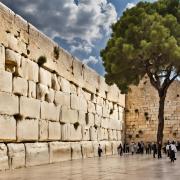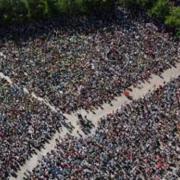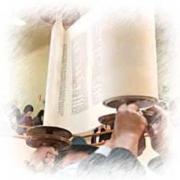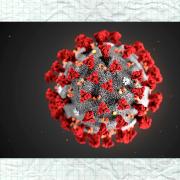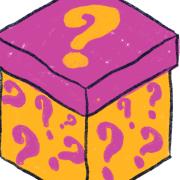Long live the King! Long live the King.. - shouted people when King David walked amongst the crowd to his throne. But did you hear about the tough road he had to go through to get to this point in his life? Even after he was established as a king, they said that his lineage was stained, and anyone who came from it and would come in the future, like Mashiach, would be stained as well. It feels like it has become almost established, and everyone is so sure of it, but is it so, and could it be any other way?
This is the topic I would like to delve into with your permission.
So, King David's lineage starts with Yehuda, the son of Yaakov Avinu.
Tamar married two of Yehudah’s sons, and both of them died. Yibum, a levirate marriage, had to be performed, but Yehudah was saving his third son for marriage to Tamar and was hesitant to allow that marriage to go forth. Tamar decides to do the unthinkable and appears at the crossroads as a zonah (prostitute), and Yehudah, without realizing that it is his daughter-in-law, hires her services.
Yehudah has relations with this woman who he thought was zonah, and she becomes pregnant. When Yehudah learns that his daughter-in-law is pregnant, he assumes that she has been unfaithful to his third son and orders her to be put to death. Tamar proves to Yehudah that she was pregnant from him, and he responds, "She is more righteous than I." as it says in Parashat Vayeshev 38:14-26.
The Midrash asks, how is it that Yehudah, patriarch of one of the Twelve Tribes of G-d, could do such a thing? What caused him to have relations with a zonah that he happens to see at the crossroads? The Midrash answers that Hashem sent Yehudah, "Malach ha'me'muneh al ha'tayvah", an Angel appointed over the attribute of human sexual desire. Yehudah was almost forced into this unseemly act. He didn’t want to do it, but somehow, a spiritual entity "forced him" into it. This angel was given such a mission because it was part of the Divine Plan that the Davidic monarchy, and ultimately the Moshiach himself, would descend from this union.
Now, let's look at the story of Yishai, the father of David HaMelech.
David's father, Yishai, was the grandson of Boaz and Ruth. After several years of marriage to his wife, Nitzevet, and after raising several virtuous children, Yishai began to question his own ancestry. True, he was the leading Torah authority of his day, but his grandmother Ruth was a convert from the nation of Moab, as it says in the book of Ruth.
Many people doubted the legitimacy of her marriage to Boaz during Ruth's lifetime. The Torah specifically forbids an Israelite to marry a Moabite convert since this nation cruelly refused the Jewish people passage through their land and did not allow them to purchase food and drinks when they wandered in the desert after being freed from Egypt.
To fix his problematic situation as he thought it was, he decided to do the following: His plan was to engage in relations with his Canaanite maidservant.
He said to her: "I will be freeing you conditionally. If my status as a Jew is legitimate, then you are freed as a proper Jewish convert to marry me. If, however, my status is blemished and I have the legal status of a Moabite convert forbidden to marry an Israelite, I am not giving you your freedom, but as a Shifchah K'Naanit, a Canaanite maidservant, you may marry a Moabite convert."
Maidservant agreed and went straight to Nitzevet, Yishai's wife, and told her about his plans. They decided to switch places, and with a prayer on her lips that the plan should succeed, Nitzevet took the place of her maidservant. That night, Nitzevet conceived. Yishai remained unaware of the switch.
After three months, her pregnancy became obvious. Enraged, her sons wanted to kill their mother with the "illegitimate" baby that she carried. But Nitzevet did not want to embarrass her husband by revealing what had occurred. And just like Tamar, who was ready to be burned alive and not to embarrass Yehudah, Nitzevet decided to keep quiet. She kept quiet for twenty-eight years, and David lived and was treated as an outcast by his family and the community. When Shmuel HaNavi anointed David, the sound of weeping could be heard from outside the room. It was the voice of Nitzevet, his mother, David’s only supporter and only source of comfort.
Her twenty-eight long years of silence in the face of humiliation were finally coming to an end. At last, all would see that the lineage of her youngest son was pure and undefiled by any blemish. Finally, the anguish and humiliation that she and her son were going through would come to an end.
All the doubts originated from these two events mentioned above... But -- something has been overlooked elsewhere, and this, in my opinion, would be the key to solving it once and for all.
Parashat Vayetzeh 29:16-18 says that Lavan had two daughters, Leah and Rachel. "Leah had weak eyes, while Rachel was shapely and beautiful." Jacob loved Rachel, and he offered to work for her for seven years.
Later, in Vayetzeh 29:23-25, "When the seven years were up, Lavan substituted Leah for Rachel on the night of the wedding. Yaakov discovered the deception only after consummating the marriage with Leah." Because Yaakov had given signs to Rachel, since both knew that Lavan might cheat and switch the sisters, so, when Rachel saw that they were bringing Leah, she said, "Now, my sister will be put to shame. So she willingly transmitted those signs to Leah.", as it says in the Masechet Megilah 13B. Rachel received a reward for this act from Hashem, and you can read about it here.
But once again, Yaakov Avinu didn't know that he was with Leah; he thought he was with Rachel.
How can Kiddushin, Betrothal, or an intent to get married be accomplished? Through three things - money or a gift, shtar or a document, and biya or being together.
- In Yaakov Avinu's case, all three items were present, and the only thing that was absent was the realization of who he was with.
- With Yehudah, he gave her "money"—items that would be exchanged later for a gift and were held by her as collateral, which had monetary value, and there was biya—he cohabited with her. The only item missing was a document/shtar, but those 2 items were enough to get married. On top of it, she was an available woman who was waiting for Yehuda's third son from that same family, and the only thing missing was Yehuda didn't know who he was with.
- With Yishai, Nitzevet was his wife, and he was married to her. Again, the only item missing was the realization of who he was with.
All three instances above have one thing in common - all three couples were together, and men didn't know who they were with. Yaakov didn't know it was Leah; Yehudah had no idea it was his daughter-in-law, Tamar, and Yishai didn't know it was his own wife, Nitzevet. (Wow.. look at the holiness level these couples practiced during their intimate moments.)
These holy ladies - Tamar and Nitzevet, have taken a vow of silence not to shame Yehuda and Yishai. Both ladies have endured plenty of shame over the centuries until today. As a reward, their lineage will have Mashiach, who will talk incessantly about G-d's greatness and will bring honor to these ladies, their lineage, and G-d Almighty.
PS: I would like to mention Lot's daughters. After their city was destroyed, the two daughters of Lot thought that no man was left in the world, so they decided to be with their father to continue mankind. To accomplish this, they decided to intoxicate their father with wine. And that’s exactly how they did it.
The oldest daughter named her child Moav—another way to read מוֹאָ֑ב would be as Me Av—which means From My Father as if she were declaring it to the world. The second daughter named her son Ben-Ammi, the Son of My Nation, which could be anyone and nothing shameful. You could say that she had a blissful life with no worries or concerns.
But the oldest asked for trouble by naming her son this way, and she got plenty of it. But because she chose to be honest, unlike her other sister, with no made-up stories, accepted her situation, and went through that shame and suffering in life—so as not to mislead anyone—she merited to have royalty come from her lineage—which makes her a link before Leah.
I believe King David's lineage has mighty and holy ancestors who have endured hardships, shame, and suffering and whose descendants will eventually elevate the Name of G-d and bring Honor to G-d Almighty.
That's why it says in Prophet Isaiah 52:13, הִנֵּ֥ה יַשְׂכִּ֖יל עַבְדִּ֑י יָר֧וּם וְנִשָּׂ֛א וְגָבַ֖הּ מְאֹֽד׃ - Behold, My servant shall prosper, He shall be exalted and lifted up, and shall be very high - Mashiach will be exalted because his ancestors endured hardships and shame, so Hashem will raise His servant to bring honor to Himself and to His servant's lineage.
And in the Prophet Isaiah 52:7-10 says, "מַה־נָּאו֨וּ עַל־הֶהָרִ֜ים רַגְלֵ֣י מְבַשֵּׂ֗ר מַשְׁמִ֧יעַ שָׁל֛וֹם מְבַשֵּׂ֥ר ט֖וֹב מַשְׁמִ֣יעַ יְשׁוּעָ֑ה אֹמֵ֥ר לְצִיּ֖וֹן מָלַ֥ךְ אֱלֹהָֽיִךְ׃ - How beautiful upon the mountains are the feet of the messenger of good news. That announcer of peace, the forerunner of good news. That announces salvation; That says unto Zion: "Your G-d is King!
ק֥וֹל צֹפַ֛יִךְ נָ֥שְׂאוּ ק֖וֹל יַחְדָּ֣ו יְרַנֵּ֑נוּ כִּ֣י עַ֤יִן בְּעַ֙יִן֙ יִרְא֔וּ בְּשׁ֥וּב ה׳ צִיּֽוֹן׃ - Your scouts raise their voices and sing together, for they shall see G-d's return to Zion with their own eyes.
פִּצְח֤וּ רַנְּנוּ֙ יַחְדָּ֔ו חׇרְב֖וֹת יְרוּשָׁלָ֑͏ִם כִּֽי־נִחַ֤ם ה׳ עַמּ֔וֹ גָּאַ֖ל יְרוּשָׁלָֽ͏ִם׃ - Break out in song, together, the ruins of Jerusalem! For G-d has consoled His people and redeemed Jerusalem!
חָשַׂ֤ף ה׳ אֶת־זְר֣וֹעַ קׇדְשׁ֔וֹ לְעֵינֵ֖י כׇּל־הַגּוֹיִ֑ם וְרָאוּ֙ כׇּל־אַפְסֵי־אָ֔רֶץ אֵ֖ת יְשׁוּעַ֥ת אֱלֹהֵֽינוּ׃ - G-d shall reveal His holy arm before all nations and all ends of the earth shall see salvations of our G-d.
And just like that, the Ruach Elokim - The Spirit of G-d, has left the waters and is walking the land.
Shmuel Katanov
Read more






